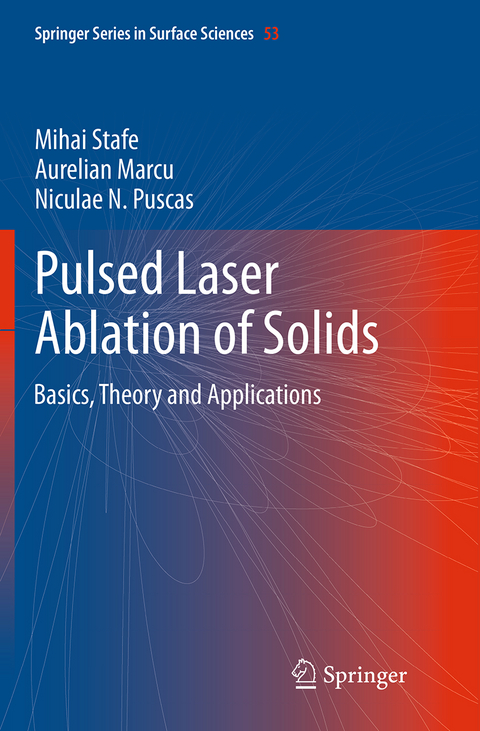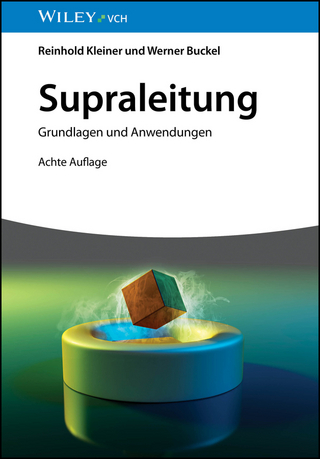
Pulsed Laser Ablation of Solids
Basics, Theory and Applications
Seiten
2016
|
Softcover reprint of the original 1st ed. 2014
Springer Berlin (Verlag)
978-3-662-50880-0 (ISBN)
Springer Berlin (Verlag)
978-3-662-50880-0 (ISBN)
This comprehensive work on pulsed laser ablation explicitly links the principles and methodology to the physical properties of the irradiated materials. From the basics to the most advanced topics, it incorporates the latest theory and experimental data.
The book introduces 'the state of the art' of pulsed laser ablation and its applications. It is based on recent theoretical and experimental studies. The book reaches from the basics to advanced topics of pulsed laser ablation. Theoretical and experimental fundamental phenomena involved in pulsed laser ablation are discussed with respect to material properties, laser wavelength, fluence and intensity regime of the light absorbed linearly or non-linearly in the target material. The energy absorbed by the electrons leads to atom/molecule excitation, ionization and/or direct chemical bond breaking and is also transferred to the lattice leading to material heating and phase transitions. Experimental non-invasive optical methods for analyzing these phenomena in real time are described. Theoretical models for pulsed laser ablation and phase transitions induced by laser beams and laser-vapour/plasma interaction during the plume expansion above the target are also presented. Calculations of the ablation speed and dimensions of the ablated micro- and nano-structures are performed. The validity and required refinement of different models in different experimental conditions is provided. The pulsed laser deposition process which bases on collecting the ablated particles on a surface is analyzed in terms of efficiency and quality of the deposited films as a function of ambient conditions, target material, laser parameters and substrate characteristics. The interaction between the incident laser and the ablation plasma is analyzed with respect to its influence on the structures of the deposited films and its capacity to generate high harmonics and single attosecond pulses which are highly desirable in pump-probe experiments.
The book introduces 'the state of the art' of pulsed laser ablation and its applications. It is based on recent theoretical and experimental studies. The book reaches from the basics to advanced topics of pulsed laser ablation. Theoretical and experimental fundamental phenomena involved in pulsed laser ablation are discussed with respect to material properties, laser wavelength, fluence and intensity regime of the light absorbed linearly or non-linearly in the target material. The energy absorbed by the electrons leads to atom/molecule excitation, ionization and/or direct chemical bond breaking and is also transferred to the lattice leading to material heating and phase transitions. Experimental non-invasive optical methods for analyzing these phenomena in real time are described. Theoretical models for pulsed laser ablation and phase transitions induced by laser beams and laser-vapour/plasma interaction during the plume expansion above the target are also presented. Calculations of the ablation speed and dimensions of the ablated micro- and nano-structures are performed. The validity and required refinement of different models in different experimental conditions is provided. The pulsed laser deposition process which bases on collecting the ablated particles on a surface is analyzed in terms of efficiency and quality of the deposited films as a function of ambient conditions, target material, laser parameters and substrate characteristics. The interaction between the incident laser and the ablation plasma is analyzed with respect to its influence on the structures of the deposited films and its capacity to generate high harmonics and single attosecond pulses which are highly desirable in pump-probe experiments.
Lasers for Pulsed Laser Ablation.- Laser-Matter Interaction Below the Plasma Ignition Threshold Intensity.- Laser-Matter Interaction Above the Plasma Ignition Threshold Intensity.- Material Removal and Deposition by Pulsed Laser Ablation and Associated Phenomena.- Experimental Techniques for Analyzing the Material Removal and Deposition Rates in Real Time.
| Erscheinungsdatum | 01.09.2016 |
|---|---|
| Reihe/Serie | Springer Series in Surface Sciences |
| Zusatzinfo | XII, 233 p. 140 illus., 11 illus. in color. |
| Verlagsort | Berlin |
| Sprache | englisch |
| Maße | 155 x 235 mm |
| Themenwelt | Naturwissenschaften ► Physik / Astronomie ► Atom- / Kern- / Molekularphysik |
| Naturwissenschaften ► Physik / Astronomie ► Festkörperphysik | |
| Naturwissenschaften ► Physik / Astronomie ► Theoretische Physik | |
| Schlagworte | ablation plasma • Applied and Technical Physics • applied physics • Condensed matter physics (liquid state and solid s • Electricity, electromagnetism and magnetism • interaction between laser and plasma • laser plasma interaction • Laser processing • Materials Science • optical physics • Optics and Electrodynamics • Physics and Astronomy • pulsed laser ablation • pulsed laser depostion • Surface and Interface Science, Thin Films • Surface chemistry and adsorption • Surfaces and Interfaces, Thin Films |
| ISBN-10 | 3-662-50880-X / 366250880X |
| ISBN-13 | 978-3-662-50880-0 / 9783662508800 |
| Zustand | Neuware |
| Informationen gemäß Produktsicherheitsverordnung (GPSR) | |
| Haben Sie eine Frage zum Produkt? |
Mehr entdecken
aus dem Bereich
aus dem Bereich
Buch | Softcover (2024)
Wiley-VCH (Verlag)
CHF 83,85


